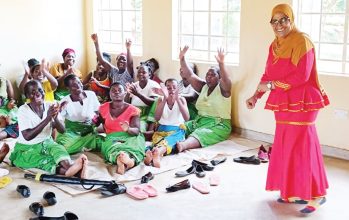Mapping a digital future for children
Malawi today joins the rest of the African continent in commemorating the Day of the African Child, whose theme this year is The Rights of the Child in the Digital Environment.
The day aims at raising awareness of the ongoing need to improve education for children in Africa.
In a statement issued ahead of the day, the Ministry of Gender, Community Development, and Social Welfare acknowledges that the internet has provided invaluable opportunities for the realisation of children’s fundamental rights and freedoms such as the right to education, freedom of expression, and freedom of association.
“The overall objective of the Day of the African Child 2023 is to raise awareness of the promotion and protection of children’s rights in the digital environment and to encourage relevant stakeholders to make commitments towards the realization of children’s rights in the digital environment,” reads the statement in part.
One of the children that are thriving in digital technology is Lilongwe-based Joshua Chatata.

The 14-year-old is one of the 21 Malawian youths that benefited from United Nations Children’s Fund (Unicef)’s African Drone and Data Academy (ADDA) which is aimed at equipping young people in Malawi and Africa with necessary 21st Century skills, while strengthening the drone ecosystem for more effective humanitarian and development response.
Joshua hails his experience at the Academy as having equipped him with elevant skills.
He says: “I learnt a lot of things such as 3D printing, glider construction, drone construction, and flying a drone. I also learnt a software named Computer-Aided Design [CAD].
“As a teenager, I like science. The fact that science is in everything that surrounds us fascinates me and instils an observation and experimentation culture within me,” he explains.
Joshua went through his training at the Malawi University of Science and Technology (Must) following his passion for information and communication technologies (ICT).
He says he is always keen to learn more from others that have experience in such fields.
Unicef Malawi deputy representative Gerrit Maritz, believes that when used in the right way, the Internet offers limitless opportunities such as learning and developing social networks, however.
However, he was quick to point out that, growing up online also comes with serious risks for children, including cyber bullying, online sexual exploitation and abuse, and other forms of peer-to-peer violence.
Says Maritz: “Globally, children are spending more time online than ever before, and children in Africa are not spared. As we celebrate the 2023 Day of the African Child, let us join hands in safeguarding rights of children in the digital space. Every child must be protected from violence, exploitation and abuse on the internet.”
Drones, data and artificial intelligence are leapfrog technologies that allow more informed and agile development responses and potentially accelerate economic growth in the region.
In her message fore the day, Plan International Malawi country director Phoebe Kasoga called upon service providers and platforms to implement appropriate safeguards to ensure the privacy and confidentiality of children’s data.
She said: “Children’s personal data should be protected in the digital environment. Service providers and platforms should follow strict data protection regulations and obtain appropriate consent from parents or guardians when collecting and processing children’s personal information.”
Kasoga further urges parents to always check what their children are watching, and government and service providers to do their part in ensuring online safety for children, and prevent cyberbullying, grooming, trafficking, and exposure to inappropriate material.
She said children should have the right to access information and participate in the digital world and be provided with the necessary digital literacy skills to navigate the online world safely and critically.
On the welfare of children in the country, Kasoga said government has been doing well on policy formulation to address challenges children face in the country.
However, she said there is still a lot of work required as implementation of policies has been a challenge at national level.
Says Kasoga: “There are still challenges in education, child protection, access to water and sanitation, leading to a high poverty rate. Poverty alleviation efforts are essential to improve the overall well-being of children in the country.
On his part, Save the Children senior advocacy, communications, campaigns and media manager John Chipeta said technologies and innovations are helping children to realise their rights to learning in terms of efficient access to information and data for their studies.
He says: “We have also noticed an increased use of digital technologies to provide continued learning to children during times of natural disasters. For instance, during Covid-19, Cyclone Freddy and others, we saw the Ministry of Education providing lessons to children through radio programmes. We have also seen some innovations where technologies like drones are used to provide medical supplies to children in hard to reach areas.”
However, Chipeta beamoned the prevailing digital divide where most Malawians especially children in rural areas have limited access to the internet.
Current data shows that internet penetration is in Malawi is currently at 24.4 percent, up from 20.2 percent of the total population at the start of 2022. The data further shows that around 4 percent of the total population uses social media as at the start of 2023.
“Expanding access to digital technologies is critical. Our children need this especially for their use to enable them to enjoy their rights to education, health and social protection. We therefore advocate for policy measures to equalize the digital divide,” said Chipeta.
According to the Ministry of Gender, Community Development and Social Welfare, the national commemoration of the day will be held in Balaka and various stakeholders will showcase efforts being done to promote the rights of children in the digital environment.
These will include the areas of education, freedom of association, access to information. The stakeholders will also raise awareness of forms of online abuse and exploitation and ways of protecting children in cyberspace.
The Africa’s Agenda for Children 2040 calls upon member States to ensure that, by 2040, schools provide universal access to affordable ICT devices, content and connectivity, and integrate these into teaching and curricula and that no child is exposed to sexual exploitation and used for child pornography.
The International Day of the African Child was first observed in 1991 to commemorate an uprising by students on June 16 1979 protesting against their unequal access to education in South Africa during apartheid.
It is also an opportunity for everyone around the world to help make sure that every child can reach their potential through education and support.





